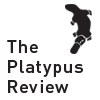On March 17, 2012, Ross Wolfe and Pam Nogales of the Platypus Affiliated Society interviewed Domenico Losurdo, the author, most recently, of Liberalism: A Counter-History (2011).
Transcript in Platypus Review #46 (Click below):

A lecture by Platypus member James Vaughn upon the history of humanity between 1600 and 1763, given as part of the Platypus summer 2011 radical bourgeois philosophy reading group. Held on July 27, 2011 in Philadelphia.
Platypus Summer Reading Group 2011: Radical Bourgeois Philosophy
Rousseau-Smith-Kant-Hegel-Nietzsche
We will address the greater context for Marx and Marxism through the issue of bourgeois radicalism in philosophy in the 18th and 19th Centuries. Discussion will emerge by working through the development from Kant and Hegel to Nietzsche, but also by reference to the Rousseauian aftermath, and the emergence of the modern society of capital, as registered by liberals such as Adam Smith and Benjamin Constant.
"The principle of freedom and its corollary, 'perfectibility,' . . . suggest that the possibilities for being human are both multiple and, literally, endless. . . . Contemporaries like Kant well understood the novelty and radical implications of Rousseau's new principle of freedom [and] appreciated his unusual stress on history as the site where the true nature of our species is simultaneously realized and perverted, revealed and distorted. A new way of thinking about the human condition had appeared. . . . As Hegel put it, 'The principle of freedom dawned on the world in Rousseau, and gave infinite strength to man, who thus apprehended himself as infinite.'"
- James Miller (author of The Passion of Michel Foucault, 2000), Introduction to Rousseau, Discourse on the Origin of Inequality (Hackett, 1992)
Platypus President's report by Chris Cutrone at the third annual Platypus Affiliated Society international convention, Chicago, May 1, 2011.
The usual ways of categorizing various trends on the "Left" today have become less useful for distinguishing politically and indicating potential future developments. Trends have defied historical or expected trajectories -- if these in fact ever applied properly -- and so call for a new and different approach to sort out what we're dealing with today and are likely to encounter going forward. Platypus has been rightly recognized (if only occasionally and intermittently) for traversing if not transcending these categories in the approach of our project. Other sets of categories that can be usefully problematized by the "anti-fascist" vs. "anti-imperialist" division are: 1.) socialist vs. liberal; 2.) libertarian vs. authoritarian; and 3.) anti-Stalinist vs. Stalinist.

